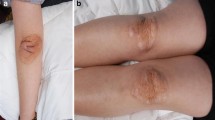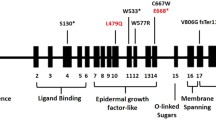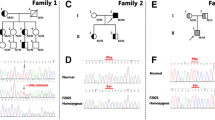Abstract
Familial Hypercholesterolemia is an autosomal, dominant genetic disorder associated with premature cardiovascular disease (CVD). Mutations in the LDLR, APOB, and PCSK9 genes cause the FH phenotype, but in 20% of FH patients, mutations in other genes cause FH. In this regard, we investigated the genetic basis of an Autosomal Dominant Hypercholesterolemia (ADH) phenotype in an Iranian family via next-generation exome sequencing with a panel of hyperlipidemia. We report the first case of FH in an Iranian family due to a mutation in the APOE gene. A 10-year-old female was referred to our genetic clinic with a family history of hypercholesterolemia and high cholesterol level at the age of 3. Evaluation of the lipid profile showed the off total cholesterol of 338 mg/dl, low-density lipoprotein cholesterol (LDL-C of 247 mg/dl(. We identified a mutation in the APOE gene, c.500_502del /p. Leu167del confirmed co-segregation in three individuals of the family from three generations. This in-frame mutation identified here, the first report in Iran, confirms previous reports that ADH can be caused by mutations within the APOE gene and strongly introduces it as the 4th gene that must be checked in the genetic investigating of FH.

Similar content being viewed by others
References
Wonderling D, Umans-Eckenhausen MA, Marks D, Defesche JC, Kastelein JJ, Thorogood M, editors. Cost-effectiveness analysis of the genetic screening program for familial hypercholesterolemia in The Netherlands. Seminars in vascular medicine; 2004: Copyright© 2004 by Thieme Medical Publishers, Inc., 333 Seventh Avenue, New York, NY 10001, USA.
Austin MA, Hutter CM, Zimmern RL, Humphries SE. Familial hypercholesterolemia and coronary heart disease: a HuGE association review. Am J Epidemiol. 2004;160(5):421–9.
van Aalst-Cohen ES, Jansen AC, Tanck MW, Defesche JC, Trip MD, Lansberg PJ, et al. Diagnosing familial hypercholesterolaemia: the relevance of genetic testing. Eur Heart J. 2006;27(18):2240–6.
Movahedian A, Ghannadi A, Vashirnia M. Hypocholesterolemic effects of purslane extract on serum lipids in rabbits fed with high cholesterol levels. Int J Pharmacol. 2007;3(3):285–9.
Awan Z, Choi HY, Stitziel N, Ruel I, Bamimore MA, Husa R, et al. APOE p.Leu167del mutation in familial hypercholesterolemia. Atherosclerosis. 2013;231(2):218–22.
Marduel M, Ouguerram K, Serre V, Bonnefont-Rousselot D, Marques-Pinheiro A, Erik Berge K, et al. Description of a large family with autosomal dominant hypercholesterolemia associated with the APOE p.Leu167del mutation. Hum Mutat. 2013;34(1):83–7.
Okorodudu DE, Crowley MJ, Sebastian S, Rowell JV, Guyton JR. Inherited lipemic splenomegaly and the spectrum of apolipoprotein E p.Leu167del mutation phenotypic variation. J Clin Lipidol. 2013;7(6):566–72.
Subramani KS, Kolhari VB, Manjunath CN, Bhairappa S. Familial hypercholesterolaemia presenting with coronary artery disease in a young patient. BMJ Case Rep 2013;2013:bcr2013008718.
Herz J, Chen Y. Reelin, lipoprotein receptors and synaptic plasticity. Nat Rev Neurosci. 2006;7(11):850–9.
Cenarro A, Etxebarria A, de Castro-Oros I, Stef M, Bea AM, Palacios L, et al. The p.Leu167del mutation in APOE gene causes autosomal dominant hypercholesterolemia by Down-regulation of LDL receptor expression in hepatocytes. J Clin Endocrinol Metab. 2016;101(5):2113–21.
Henderson R, O'Kane M, McGilligan V, Watterson S. The genetics and screening of familial hypercholesterolaemia. J Biomed Sci. 2016;23:39.
https://genetics.bwh.harvard.edu/pph2. Wsh. PolyPhen-2 prediction of functional effects of human nsSNPs accessed January 2013.
Nguyen TT, Kruckeberg KE, O'Brien JF, Ji ZS, Karnes PS, Crotty TB, et al. Familial splenomegaly: macrophage hypercatabolism of lipoproteins associated with apolipoprotein E mutation [apolipoprotein E (delta149 Leu)]. J Clin Endocrinol Metab. 2000;85(11):4354–8.
Faivre L, Saugier-Veber P, Pais de Barros JP, Verges B, Couret B, Lorcerie B, et al. Variable expressivity of the clinical and biochemical phenotype associated with the apolipoprotein E p.Leu149del mutation. Eur J Hum Genet: EJHG. 2005;13(11):1186–91.
Rahalkar AR, Wang J, Sirrs S, Dimmick J, Holmes D, Urquhart N, et al. An unusual case of severe hypertriglyceridemia and splenomegaly. Clin Chem 2008;54(3):606-10; discussion 10-1.
Mohd Nor NS, Al-Khateeb AM, Chua Y-A, Mohd Kasim NA, Mohd NH. Heterozygous familial hypercholesterolaemia in a pair of identical twins: a case report and updated review. BMC Pediatr. 2019;19(1):106.
Wiegman A, Gidding SS, Watts GF, Chapman MJ, Ginsberg HN, Cuchel M, et al. Familial hypercholesterolaemia in children and adolescents: gaining decades of life by optimizing detection and treatment. Eur Heart J. 2015;36(36):2425–37.
Moorjani S, Roy M, Gagne C, Davignon J, Brun D, Toussaint M, et al. Homozygous familial hypercholesterolemia among French Canadians in Quebec Province. Arteriosclerosis (Dallas, Tex). 1989;9(2):211–6.
Wintjens R, Bozon D, Belabbas K, MBou F, Girardet JP, Tounian P, et al. Global molecular analysis and APOE mutations in a cohort of autosomal dominant hypercholesterolemia patients in France. J Lipid Res. 2016;57(3):482–91.
Versmissen J, Oosterveer DM, Yazdanpanah M, Defesche JC, Basart DC, Liem AH, et al. Efficacy of statins in familial hypercholesterolaemia: a long term cohort study. BMJ (Clinical research ed). 2008;337:a2423.
Marks D, Wonderling D, Thorogood M, Lambert H, Humphries SE, Neil HA. Cost effectiveness analysis of different approaches of screening for familial h. BMJ (Clinical research ed). 2002;324(7349):1303.
Acknowledgments
The authors thank the proband family and the nurses and staff of the Genetic clinic.
Author information
Authors and Affiliations
Corresponding author
Ethics declarations
Conflicting interests
The authors declared no potential conflicts of interest with respect to this article.
Additional information
Publisher’s note
Springer Nature remains neutral with regard to jurisdictional claims in published maps and institutional affiliations.
Rights and permissions
About this article
Cite this article
Noorian, S., Razmandeh, R. & Jazayeri, R. Familial hypercholesterolemia in an Iranian family due to a mutation in the APOE gene (first case report). J Diabetes Metab Disord 21, 1201–1205 (2022). https://doi.org/10.1007/s40200-022-01007-1
Received:
Accepted:
Published:
Issue Date:
DOI: https://doi.org/10.1007/s40200-022-01007-1




